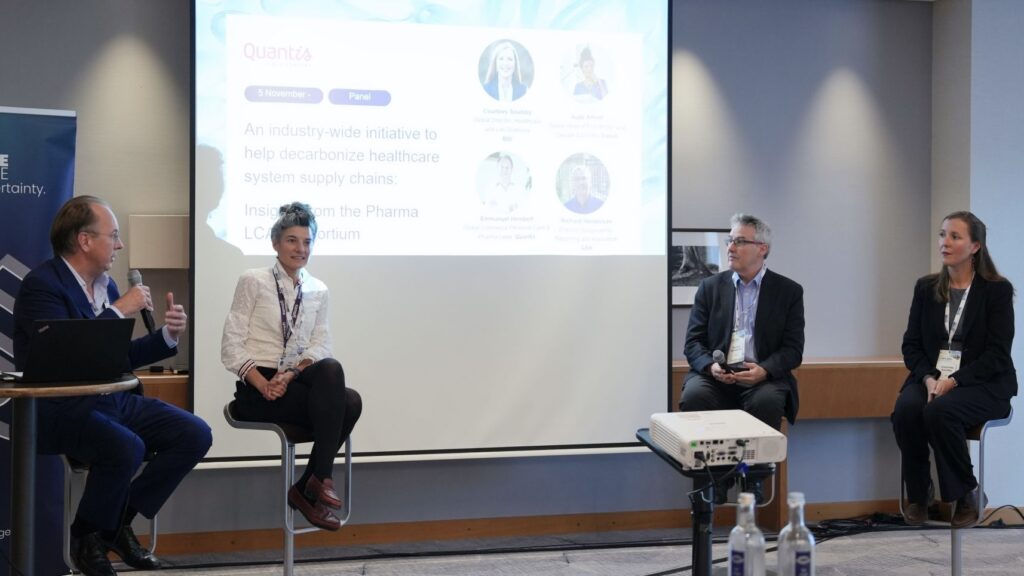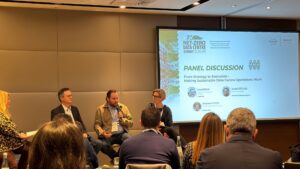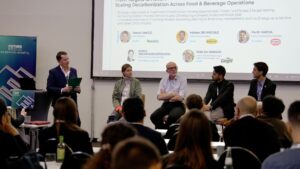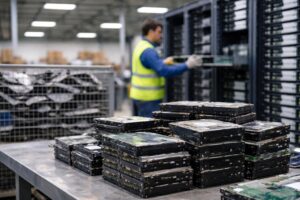Getting to zero emissions is not some far-off idea for the pharma and biotech industries anymore. It’s an urgent job that’s completely shaking things up. The recent 4th Net-Zero Life Sciences Forum wasn’t just a regular event; it was the key spot where leaders and new thinkers from all parts of the industry met up. Everyone there realized one big thing: being sustainable isn’t a cost – it actually drives better competition, better efficiency, and helps companies follow the strict rules in this sector. So, this article will share the best ideas from the forum. It will give you a close look at what experts said and which companies are leading this important industry change.
Sessions at the 4th Net-Zero Life Sciences Forum
Cutting carbon in big industrial facilities is tough work. You need people who really understand utilities, buildings, & supply chains. That’s why we built this forum – to bring together experts who are actually making these changes right now. These sessions gave attendees practical, detailed strategies & technology plans to help them make real progress back at their own companies. So, here’s a peek at what we heard:
Driving impact by balancing the well-being of the people & the planet
Speaker: Nassera Ahmed, Senior Director, Global Sustainability, Coloplast
Nassera looked at the crucial balance between a company’s drive for sustainability and taking care of the people. She demonstrated how helping people with specific intimate healthcare needs fits perfectly within the company’s wider sustainable work. Also, we learned what it takes to build a truly sustainable culture, including the challenges/tough problems that arise when we try to make changes across an organization. Moreover, Nassera stressed that integrating goals for people with environmental care creates a stronger, more ethical net-zero strategy. The core message: real impact comes when we balance company purpose with the health of the planet.
Accelerating Net Zero with Transparency in Energy Flows
Speaker: Lars Vogel, Industry Manager Building Automation, Life Sciences, Semiconductor, Emerson
Lars explained exactly why factories must track WAGES (Water, Air, Gas, Energy, and Steam) so closely. He spent a lot of time on steam, since it often creates a major source of CO2 pollution during operations. Furthermore, Lars presented intelligent/efficient solutions for managing key utilities such as compressed air & pure gases for the life sciences. In addition, he underlined that it is crucial to collect solid/detailed operational data and feed it into Energy Management Systems. This is because companies need that transparency to accelerate net-zero initiatives.
Optimizing Your Compressed Air System with Heat Recovery
Speaker: Callum Ross, Business Development Manager – Food & Pharma, Kaeser Kompressoren
Callum gave us a clear introduction to compressed air systems, a utility that people often forget when they plan to cut carbon. First, he focused on efficiently operating the air compressor station for immediate operational savings. In addition, the speaker introduced heat recovery as a critical, yet often untapped, way to unlock substantial energy savings inside the system. Additionally, he went on to explain the technical points clearly by sharing a short/real-world case study & showing the benefits of the solution in life sciences.
Handling ever-changing sustainability regulations & compliance requirements
Speaker: Karen Pulley, Head of Sustainability – Consilient Health
Karen gave attendees a very important roadmap for how to deal with complex ESG rules. She specifically addressed key frameworks such as the:
- Net-Zero Industry Act,
- CSDDD,
- and the EIA Directive.
The presenter detailed the big impact of the recent CSRD amendments, explaining the new thresholds and reporting companies must now follow. She also gave a set of effective strategies for aligning global regulations. It ensures successful cross-border compliance. At the end, she discussed the need for standardized sustainability metrics – matching operations with global frameworks like GRI. She also spoke on strengthening company oversight.
Unlocking Energy Efficiency in the Pharma Industry While Staying Competitive
Speakers: Amr Rizk, Offering manager, Industrial heating & cooling, Solstice Advanced Materials; Lauri Salmia, Applied Product Portfolio Manager, Trane Technologies
Amr and Lauri presented how the use of Solstice HFOs enables the industry to employ very efficient, yet still affordable, HVAC solutions. They expressed the belief that heating and cooling are part of one big/connected thermal system that companies need to optimize in its entirety. Moreover, they emphasized that choosing the right technology and the right refrigerant is key to success for any factory setup. The technical deep dive done here showed that smart choices with refrigerants and thermal systems would lead to massive energy savings. This is while ensuring competitiveness for companies.
Decarbonization Roadmap at Takeda
Speaker: Dr. Reto Müller, Head of Asset Management and Sustainability – Takeda Pharmaceutical Company Limited
Dr. Reto began by elaborating on Takeda’s commitment to sustainability objectives. The core of the presentation focused on the specific technology chosen for cutting carbon, which serves as the plan’s strategic foundation. Furthermore, the speaker gave us a deep look at the initial testing phase and the planned rollout of these technologies across the company’s facilities. The session was concluded with a clear review of the immediate results achieved so far. This is, along with a simple explanation of the next planned steps in their continuous journey toward net-zero operations.
Flexibility Management as a Lever for Industrial Decarbonization
Speaker: Daniel Saager, Senior Consultant, Siemens
Daniel addressed how we should see energy price changes not just as a problem, but as a significant opportunity for smart factory operations. The core of his session highlighted Flexibility Management, exploring its potential as a powerful tool for cutting carbon. The speaker contrasted flexible assets and how companies managed them in the past with the exciting new possibilities for the future. Importantly, the speaker underlined how cross-financing strategies have to be put in place by organizations to join flexibility optimization with efforts of deep decarbonization on a financially viable and sustainable pathway of industry change.
Responding to the Demand: How Life Cycle Assessments Inform Our Approach
Speaker: Oliver Watts, Sustainability Director, EMEA, Medline International
Oliver focused on how fast-changing customer expectations drive the shifts in industry purchasing of medical devices. Furthermore, he explained the approach to conducting LCAs to create data-driven impact measurement. This provides a robust, scientific evidence base for sustainability claims. Moreover, the presenter underlined that strong collaboration is important, especially the direct partnership of customers & end-users themselves. This is to jointly lower product- and service-originated emissions along the value chain. This team-based approach makes sure our sustainability plans line up with real customer needs and purchasing rules.
Navigating to Thriving: How Small-Country Subsidiaries Can Drive Big Impact on Net-Zero Goals in Europe’s Evolving Sustainability Landscape
Speaker: Andy Clarke, Head of Sustainability and Public Affairs UK & Ireland, Bayer
Andy gave an insightful view of how smaller country subsidiaries can become powerful engines for major net-zero goals. The session covered smart ways to work directly with policymakers to help shape the rules. Furthermore, the speaker positioned the subsidiary as a key “shop window country,” demonstrating best practices the company can scale internationally. This discussion elaborated on how there’s a need to move from just counting the carbon footprint to the actual implementation of carbon-cutting activities. Besides, the benefits/drawbacks of adopting a circular economy in pharmaceuticals were discussed. So, the focus was on using limited resources to achieve major results.
Adapting AHU Design to Modern Pharmaceutical Clean Room Requirements
Speaker: Laurence Higginson, Business Development Director, Robatherm
The session provided an overview of heat recovery solutions and how those solutions greatly reduce overall energy consumption. The presenter highlighted the ability to calculate an individual Life Cycle Assessment (LCA) for each AHU. This is vital for smart buying. The discussion also covered key ways he reduces the CO2 footprint. Moreover, the speaker reflected the big impact of part-load design and how to manage system backups to guarantee uninterrupted production. He also talked about designing the product to be recyclable at the end of its life, which would be in line with circular economy principles.
PANEL DISCUSSION: The Challenge of Decarbonization: How Pharma is Navigating the Net-Zero Transition
MODERATOR – Bruno Lupulescu, Global Business Development Manager, Siemens Smart Infrastructure, Energy and Sustainability Services
Speakers – Dr. Michael Hell, Head of Environment & Sustainability – Merck Global Healthcare Operations; Baptiste Narbon, Global Environmental Sustainability Lead – Ferring Pharmaceuticals.
This high-level panel at the 4th Net-Zero Life Sciences Forum discussed the divide between big/global climate ambitions & the actual work of executing them when we talk about the local level. This is especially true because different countries have different rules. The panel explored the various structured programs major pharmaceutical companies are using to systematically manage their carbon-cutting efforts. A key topic was how to pay for the net-zero change. It includes getting money for big, long-term infrastructure projects. The speakers also talked about the company-wide hurdles and cultural problems that large organizations must fix to make the shift successful.
Carbon Savings Now – Direct-Contact Heat Recovery/Retrofit Strategies for Decarbonizing Life Sciences
Speaker: David Coletta, Global Director of Strategic Partnerships, Thermal Energy International
The speaker revealed often-missed opportunities in waste heat recovery, specifically identifying typical energy losses within pharmaceutical steam systems. Furthermore, David clearly distinguished direct versus indirect contact heat recovery, giving simple advice on when to use each method. The discussion also shed light on matching heat sources with viable heat sinks. The speaker detailed a strategic approach for assessing/developing/prioritizing heat recovery projects on pharmaceutical sites. Additionally, real-world case studies demonstrated how they integrated heat recovery with heat pumps to achieve maximum operational impact and carbon reduction.
ESTEVE’s Journey to Zero
Speaker: Carlos García, Global EHS Governance Manager, Esteve
Carlos put emphasis on the urgency of reaching net-zero and why it stands to be one of the core business priorities for ESTEVE. Furthermore, he went into the explanation of how the company measures its carbon footprint, sharing the roadmap toward achieving the transition. He also highlighted actions being taken across the value chain. Additionally, Carlos emphasized tracking progress by ensuring accountability and transparency. He concluded the session by sharing various sustainability initiatives that will further strengthen the long-term commitment of ESTEVE by reducing the environmental impact.
Circular Thermal – Efficiently Including High-Temperature Heat Pumps in Industrial Processes
Speaker: Rossen Ivanov, Managing Director EMEA, Armstrong International EMEA
This session by Rossen introduced the Circular Thermal® concept, detailing how to efficiently add industrial high-temperature heat pumps. He explained the technical process: recovering waste heat from cooling systems to make heat for critical jobs like WFI, reactors, or dryers. A key strategy discussed was replacing steam humidifiers with adiabatic alternatives. This is to significantly cut the need for steam generation, distribution, and condensate return. Rossen also analyzed how both adiabatic humidification and heat pumps affect Air Handling Unit energy management.
PANEL DISCUSSION: Transforming Processes to Meet Climate/ Business Goals
MODERATOR – Tomaž Orešič, Vice President, Resalta.
Speakers – Dr. Michael Hell, Head of Environment & Sustainability – Merck Global Healthcare Operations; Dr. Reto Müller, Head of Asset Management & Sustainability – Takeda Pharmaceutical Company Limited.
The key panel discussed how to balance strict regulations and operational limits with the need to cut carbon in energy-heavy life sciences production. Furthermore, the discussion focused on tackling emissions from high-use areas, including:
- HVAC systems,
- Clean utilities,
- And complicated supply chains.
They also detailed the trade-offs involved in balancing system reliability, regulatory compliance, and investment in infrastructure projects with a long cycle. Panelists discussed how pharma companies are now strategically adding decarbonization into core operations. This is to meet both quality and business requirements.
Sustainability Challenges & Opportunities for Cell/Gene Therapy
Speaker: Adam Liddle, Head of Sustainability – RoslinCT
The speaker presented an overview of the organization’s specific sustainability plan, recognizing the unique environmental factors in this fast-growing sector. The session identified key shareholders and their priorities that are driving sustainability forward. Moreover, a central topic was manufacturing efficiencies, with a strong focus on crucial waste reduction strategies unique to cell and gene therapy production. Adam also demonstrated how digital strategies can effectively drive sustainability within the production environment. Finally, the speaker positioned the sector’s rapid growth as a major investment area. It is bringing a significant opportunity to embed sustainability from the very start.
Taming the Decarbonization Monster: The State after Quick Wins
Speaker: Dr. Michael Hell, Head of Environment & Sustainability, Merck Global Healthcare Operations
Dr. Michael gave a practical view of the net-zero journey at the 4th Net-Zero Life Sciences Forum. The speaker admitted that every company follows a different path, but the process is becoming more standardized. The speaker identified Scope 3 emissions, which are outside of direct control, as the lasting “monster” that companies must still tame for real progress. The discussion introduced practical approaches to help with the change, such as measuring the carbon footprint of individual products. The speaker also addressed the difficulties of tackling the most challenging decarbonization issues within the strict constraints of a highly regulated pharmaceutical environment. So, it offered an honest assessment of the state of play after the initial easy wins.
EU Energy Efficiency Directive: Making it Work for You to Remain Competitive, Reduce Energy Costs, and Achieve Your Decarbonisation Goals
Speaker: James Dooley, Technical Commercial Manager, EM3
James provided necessary advice on how organizations must rethink their energy plans. This is to align with the recent changes in the European Union’s Energy Efficiency Directive. The session highlighted the importance of conducting full energy audits to effectively find/use opportunities for optimization and address existing inefficiencies. Furthermore, the speaker detailed the big additional benefits that come from formal energy audits and established Energy Management Systems. The discussion also included the step-by-step EnMS implementation process. It explained how following ISO 50001 helps organizations achieve compliance. This is while simultaneously cutting operational costs. The session also displayed some success stories that gave away actionable steps/practices.
Turning Net Zero & Resilience Ambitions into Lasting Impact: Bridging Strategy and Execution
Speakers: Karsten Peleikis, Climate & Sustainability Services Leader; Martin Hellmuth, Project Delivery Leader within Pharma Engineering & Advisory Services, Arup
This dual-speaker session focused on the critical move from mere ambition to measurable/sustained results on the ground for life sciences organizations. The speakers introduced Strategic Program Management as a robust mechanism for avoiding “stranded transformations.” This involves:
- Leveraging effective coordination,
- Managing complexity across multi-site portfolios,
- And utilizing digital tools to ensure projects transition from concept to completion.
Furthermore, the presenters emphasized creating value through resilience. This ensures that all decarbonization and sustainability initiatives actively drive operational robustness. It thereby transforms sustainability itself into a tangible source of competitive advantage.
Leverage Operational Data to Drive Decarbonization, Operational Savings, and Regulatory Compliance
Speaker: Aoife Kelly, Global Lead for Sustainable Design, Arcadis
Aoife demonstrated how harnessing operational data is key to identifying and successfully driving decarbonization opportunities. This is within complex pharmaceutical facilities. Furthermore, she focused on the crucial process of translating raw energy and emissions data into actionable financial insights. They are necessary for securing informed capital investment. Moreover, the presenter addressed the immediate need for organizations to adapt to new EU regulatory requirements regarding energy audits, efficiency measures, and required sustainability disclosures. Additionally, the session was underpinned by case studies, offering proven strategies for achieving significant emissions reductions. It also gave ways for operational savings in the net-zero life sciences sector.
Pathways to Net Zero: Integrated Renewable Energy Solutions for the Industry
Speaker: Peter Gnos, CSO, SOLID Solar Energy Systems GmbH
The speaker began by providing an essential overview of the current market and policy landscape, along with industrial energy demand trends. Furthermore, there was a highlight on both barriers and opportunities for decarbonization. Peter introduced “Energy as a Service” as a scalable model that facilitates decarbonization. This is achieved by outsourcing energy transformation, delivering economic and operational benefits. Moreover, the session focused on integrated technology solutions, detailing the crucial role of solar thermal for industrial process heat, and how it can be integrated with photovoltaics and heat pumps. Peter also stressed the importance of both seasonal and short-term energy storage for enhancing energy security.
Smart Cleanroom Strategies: Reducing HVAC Energy Use Without Compromising Compliance
Speaker: Salvador López Díaz de Rada, Business Development Manager, Telstar
The speaker challenged traditional assumptions by asking if there exists a more efficient, reliable, and modern alternative to relying on fixed Air Change Rates (ACR). The session proposed that such an alternative could deliver potential savings of up to 50% in HVAC energy consumption. Furthermore, he addressed critical operational concerns, such as how quickly the system would react during a particle excursion event to maintain safety and compliance. Attendees were invited to review a detailed case study demonstrating how the Smart Cleanroom concept achieves significant energy savings. This is without ever compromising the product integrity required in pharmaceutical manufacturing environments.
Decarbonizing the Life Sciences Industry
Speakers: Emilio Moia, Subject Matter Expert, Energy; Maria Elena Gasperini, Global Sustainability Director for Life Sciences, Jacobs
This dual-speaker session at the 4th Net-Zero Life Sciences Forum provided a strategic look at how to approach the vast challenge of decarbonizing the life sciences industry. The presenters detailed effective energy-saving strategies that can be implemented across diverse facilities. Furthermore, they emphasized the powerful role of energy modeling as a tool to support the identification of best-case scenarios for emissions reduction and capital deployment. Moreover, the speakers introduced and discussed the application of a rigorous Risk-Based Approach. This approach is essential for prioritizing and executing decarbonization initiatives. This is in a manner that ensures both regulatory compliance and operational safety in the highly regulated sector.
Implementing a Digital Strategy for a Sustainable MES-ERP Interface: Advancing Net-Zero Goals through Smarter Systems Integration
Speaker: Marcel Kruse, Head of IT Manufacturing and Automation, Nextpharma
Marcel, in this session, focused on preparing organizations to be fully ready for IoT 4.0. It involves establishing seamless communication with machines & leveraging machine data effectively. The core of the session detailed the design and implementation of a sustainable MES-ERP interface. This is a crucial step for manufacturing excellence. Furthermore, the presenter demonstrated how a data-driven decarbonization strategy emerges directly from this integration. It also enables informed decision-making. Additionally, the session concluded by emphasizing the absolute necessity of breaking down traditional silos between Information Technology (IT) and Operational Technology (OT) departments. This is to truly achieve successful net-zero life sciences manufacturing.

PANEL DISCUSSION: An industry-wide initiative to help decarbonize healthcare system supply chains: Insights from the PEG LCA Consortium
MODERATOR – Emmanuel Hembert, Global Head of Cosmetics, Personal Care & Pharma, Quantis.
Speakers: Aude Arkam, Global Head of Eco-design and Circular Economy – Sanofi; Courtney Soulsby, Global Director, Healthcare and Life Sciences – BSI; Richard Henderson, Director Sustainability – Reporting and Assurance, GSK.
This expert roundtable brought together leaders from the PEG (Pharma Environmental Group) LCA Consortium to explore this industry-wide initiative aimed at tackling complex supply chain challenges. The speakers articulated the key drivers behind forming this collaborative effort. They highlighted the concrete ways it is advancing the decarbonization of healthcare supply chains. Moreover, a significant part of the discussion covered the challenges ahead. It specifically involves the required shift from mere measurement to systemic transformation across the sector. Additionally, the consortium’s journey offered powerful, insightful lessons in the necessity of collaboration/ innovation/ achieving large-scale impact.
Sponsors At the 4th Net-Zero Life Sciences Forum
Achieving ambitious net-zero life sciences goals demands more than just strategy. It requires partnership with the technology providers and consulting firms driving the solutions. The following organizations weren’t just names on a banner; they are the architects of the industrial future. They bring the tools, software, and expertise necessary to transition global operations from paper plans to sustainable reality. So, here is a closer look at the key sponsors & the invaluable contributions they brought to the forum’s attendees:
Siemens – Gold Sponsor
Siemens stands at the global forefront of industrial transformation. It uniquely blends digitalization, AI, and sustainability across energy, manufacturing, & infrastructure sectors. Furthermore, the company is actively prioritizing a shift toward digital ecosystems, notably with its Siemens Xcelerator platform. It significantly accelerates the adoption of Industry 4.0 technologies through scalable, modular hardware & software. Moreover, Siemens is a dominant force in green hydrogen production, crucial for decarbonizing heavy industry.
Its smart grid technologies boost the efficiency of decentralized energy systems. Meanwhile, Siemens Healthineers advances AI-driven diagnostics. As a Gold Sponsor, the company reinforced its role as a key enabler, providing actionable intelligence in its session on Flexibility Management as a Lever for Industrial Decarbonization. The session demonstrated how to turn market volatility into a financing opportunity for net-zero goals.
Robatherm: The Air Handling Company – Silver Sponsor
Robatherm specializes in highly advanced air handling systems. They are meticulously engineered for contamination-sensitive environments like pharmaceuticals and biotechnology. Furthermore, their units are built to rigorous hygienic design standards. This guarantees sterile conditions through features such as HEPA H13 filtration, steam humidification, & airtight construction.
A cornerstone of their innovation is combining efficient heat recovery systems with reduced thermal bridges. It drastically improves energy efficiency without sacrificing air purity. Moreover, their modular/scalable Air Handling Units (AHUs) ensure strict regulatory compliance in complex manufacturing settings. As a Silver Sponsor, Robetherm demonstrated leadership in integrating customer-centric engineering and energy savings by presenting on Adapting AHU Design to Modern Pharmaceutical Clean Room Requirements. It gave attendees a clear roadmap for reducing the CO2 footprint of critical HVAC infrastructure.
Honeywell – Silver Sponsor
Honeywell is recognized as a dominant technology leader that advances industrial automation. This is through sophisticated AI-powered operational technology and specialized cybersecurity solutions. Furthermore, its Cyber Proactive Defense platform utilizes behavioral analysis and deception techniques. So, this robustly protects critical OT environments from complex cyber threats – an essential service in today’s digitalized industrial landscape.
Moreover, the Honeywell Digital Prime ecosystem fuses process control automation, real-time simulations, and remote asset management. It significantly reduces customer downtime and operational costs. Additionally, by embedding intelligence and security within critical infrastructure globally, Honeywell drives efficiency across commercial and industrial processes. As a Silver Sponsor, Honeywell leveraged its deep expertise to contribute valuable insights in unlocking energy efficiency in the Pharma industry while staying competitive.
Emerson – Silver Sponsor
Emerson is actively reshaping industrial automation by integrating its Plantweb digital ecosystem with AspenTech’s AI-driven software. It results in cloud-native/adaptive tools for real-time process control. Furthermore, this powerful combination empowers diverse industries, including pharmaceuticals and utilities, to successfully balance crucial goals. It includes safety, efficiency, & environmental performance. Moreover, their advanced asset performance management uses predictive analytics to cut unplanned downtime by up to 50%. This is while simultaneously accelerating operational carbon reduction efforts.
Emerson’s scalable industrial control solutions also enable enterprise-wide sustainability. This is achieved by optimizing resource utilization, energy consumption, and emissions reporting. As a Silver Sponsor, Emerson catalyzed the shift to proactive industrial management by presenting a session focused on Accelerating Net Zero with Transparency in Energy Flows. It emphasized the foundational importance of comprehensively monitoring and managing critical utilities like WAGES.
Armstrong International – Bronze Sponsor
Armstrong International is a specialist in thermal utility decarbonization. It offers advanced steam system optimization technologies and integrated consulting services. Furthermore, their pioneering Circular Thermal℠ design approach has already delivered major CO2 and energy reductions in real-world industrial settings. It includes Evotec’s facility upgrade. This success is achieved through modernizing steam traps, implementing heat pumps, and improving condensate recovery.
Moreover, the company combines customized heat management methodologies with real-time systems diagnostics and thorough energy audits. It significantly reduces fuel usage and extends asset longevity. Additionally, as a Bronze Sponsor, Armstrong distinguished itself as a key partner for thermal utility modernization, specifically through its session on Circular Thermal® – Efficiently Integrating High-Temperature Heat Pumps in Industrial Processes. It gave attendees detailed strategies for utilizing high-temperature heat pumps for process heat generation.
Arcadis – Bronze Sponsor
Arcadis operates as a global design, engineering, and consulting firm. It focuses on delivering sustainable solutions for both natural and built assets worldwide. Established over a century ago, the company leverages innovation and data-driven strategies to tackle major global challenges like urbanization and climate change. This fosters resilient and highly efficient environments.
Moreover, Arcadis integrates circular economy principles and decarbonization into its core projects across diverse sectors, including infrastructure, water, and industry. Thereby, it supports clients in achieving long-term environmental/ economic objectives. Additionally, the firm’s culture emphasizes collaboration to improve the global quality of life. As a Bronze Sponsor, Arcadis offered critical/practical value to attendees in their session – Leverage Operational Data to Drive Decarbonization. It speaks on how to turn energy and emissions data into actionable financial insights necessary for securing capital investment.
EM3 – Bronze Sponsor
EM3, based in Ireland, specializes exclusively in industrial energy management and efficiency. It offers data-driven consultancy services to help manufacturing and industrial clients significantly cut energy use and costs. Furthermore, their effective approach integrates real-time energy monitoring with rigorous expert engineering analysis. It provides bespoke solutions that boost operational efficiency and bolster decarbonization efforts. EM3’s comprehensive services include detailed energy audits, the implementation of Energy Management Systems aligned with ISO 50001 standards, Technical surveying, and measurement & verification based on international standards. This ensures full compliance and technical verification.
Moreover, known for delivering fast payback periods, EM3 focuses on sustained energy transformation. As a Bronze Sponsor, the firm was a key resource, delivering a targeted session on the EU Energy Efficiency Directive: Making it Work for You to Remain Competitive, Reduce Energy Costs, and Achieve Your Decarbonisation Goals. It gave success stories and actionable steps for compliance/ cost reduction.
Arup – Bronze Sponsor
Arup is a dominant global leader in sustainable infrastructure and resilience. It effectively integrates digital engineering and lifecycle assessment into large-scale urban and industrial projects worldwide. Furthermore, their multi-disciplinary expertise covers areas like energy, transport, and environmental planning. It facilitates the creation of holistic solutions that successfully balance engineering excellence with tangible sustainability & community impact.
Moreover, Arup is at the forefront of advancing net-zero urban district development and ecosystem restoration. It utilizes advanced data-driven design and AI modeling to accurately forecast long-term environmental performance. As a Bronze Sponsor, Arup provided forward-looking strategies in its session, Turning Net Zero & Resilience Ambitions into Lasting Impact: Bridging Strategy and Execution. This is by focusing on Strategic Program Management to ensure that decarbonization projects drive both long-term business value & operational robustness for life sciences companies.
KAESER KOMPRESSOREN – Bronze Sponsor
KAESER is a recognized leader in compressed air technology. It combines a highly robust mechanical design with its sophisticated smart digital controls, embodied by the Sigma Air Manager 4.0. This centralized system intelligently manages the air network, adjusting load and pressure. This dramatically minimizes energy consumption – a significant move, given the high energy footprint of compressed air systems.
The equipment also features predictive maintenance capabilities. It reduces downtime and extends the life of the assets. Moreover, KAESER actively champions sustainability by promoting air demand analysis and effective leak detection. As a Bronze Sponsor, the company underscored the importance of treating compressed air as a manageable asset in the journey towards net-zero life sciences, presenting its solutions for Optimizing Your Compressed Air System with Heat Recovery. This is to unlock substantial, otherwise overlooked, energy savings.
Thermal Energy International Inc. – Bronze Sponsor
Thermal Energy International specializes in innovating industrial energy efficiency by converting valuable waste heat, typically lost as exhaust, into usable thermal energy using proprietary heat recovery units like the FLU-ACE systems. Furthermore, these customized solutions are designed for the chemical, manufacturing, & food industries. It leads to substantial reductions in emissions and fossil fuel use.
Moreover, the company achieves circular thermal energy use in complex industrial environments. This is achieved by integrating intelligent control software that optimizes both heat reclaim and distribution. As a Bronze Sponsor, Thermal Energy International highlighted its contribution to industrial decarbonization by maximizing the energy value of existing processes through its session, Carbon Savings Now: Direct-Contact Heat Recovery and Retrofit Strategies for Decarbonizing Life Science. It focused on cost-effective retrofit strategies to align operations with global carbon mandates.
Jacobs – Bronze Sponsor
Jacobs is a frontrunner in developing climate-resilient and digitally enhanced infrastructure. It seamlessly integrates AI, digital twins, and BIM for optimized asset lifecycle management. Furthermore, their core methodology is designed to minimize the carbon footprint of assets. This is achieved through strategies like renewable energy use, water resource conservation, and the implementation of adaptive urban mobility systems.
Moreover, Jacobs is highly regarded for leading forward-looking projects that effectively decouple economic growth from environmental degradation. It ensures projects support regulatory compliance and social equity simultaneously. Their expertise spans net-zero facility design, smart grid development, and circularity strategies. So, it future-proofs complex industrial sites & cities. As a Bronze Sponsor, Jacobs solidified its leadership in marrying technical innovation with sustainability imperatives through its session on Decarbonizing the Life Sciences Industry. This is where it provided actionable guidance on energy modeling and applying a necessary Risk-Based Approach.
Telstar – Presenting Partner
Telstar excels as a specialist in pharmaceutical aseptic processing technology. It delivers cutting-edge solutions like advanced isolators, freeze dryers, and high-standard cleanroom HVAC systems. These technologies are crucial for ensuring the contamination-free environments mandated for the production of biologics & vaccines. Furthermore, their comprehensive systems incorporate real-time environmental monitoring, full automation, and fail-safe sterilization mechanisms. This is to comply with stringent GMP and FDA regulations globally.
Moreover, Telstar’s focused R&D efforts aim to reduce freeze-drying cycle times without compromising product integrity. Thereby, it helps pharmaceutical companies accelerate time-to-market and advance the industry toward net-zero life sciences goals. As a Presenting Partner, Telstar demonstrated its commitment to sustainable innovation in its session, Smart Cleanroom Strategies: Reducing HVAC Energy Use Without Compromising Compliance. This is by challenging the industry to adopt more efficient, modern alternatives to traditional fixed Air Change Rates.
Solid Solar Energy Systems GmbH – Presenting Partner
Solid Solar Energy Systems GmbH is dedicated to manufacturing and deploying cutting-edge heterojunction and bifacial photovoltaic technologies. These are designed to significantly enhance solar cell durability and efficiency beyond older crystalline silicon modules. Furthermore, their innovations meticulously optimize light absorption using dual-sided cells and multi-layer passivation. This leads to a major increase in overall energy yields.
Solid Solar’s versatile modules are engineered for integration into large-scale industrial solar farms and commercial rooftops. So, they are directly supporting key European renewable energy targets. The company also maintains a strong focus on manufacturing processes that reduce material waste and maximize product life. As a Presenting Partner, Solid Solar offered a valuable perspective in its session, Pathways to Net Zero: Integrated Renewable Energy Solutions for the Industry. This is by detailing the role of integrated solar thermal and Energy as a Service models for industrial process heat.
Quantis: A BCG company – Panelist Partner
Quantis, now integrated into BCG, is a distinguished global leader in sustainability strategy and environmental measurement. It excels at converting highly complex environmental data into straightforward/actionable business intelligence. Furthermore, their deep expertise covers critical areas such as water footprinting, Lifecycle Assessment (LCA), and biodiversity metrics. So, this allows clients to establish scientifically credible and ambitious targets.
Moreover, the Quantis methodology assists multinational corporations in transparently reporting their environmental impacts. It also helps in developing strategies that actively foster regulatory compliance, climate resilience, & circularity across their value chains. As a Panelist Partner, Quantis brought its rigorous scientific analysis to the discussion on An industry-wide initiative to help decarbonize healthcare system supply chains: Insights from the PEG LCA Consortium. It gave the necessary expertise to explore the critical shift from measurement to systemic transformation.
Resalta – Panelist Partner
Resalta operates as a major decarbonization-as-a-service provider. They are primarily focused on Central and Eastern Europe. They have helped public, commercial, and industrial clients successfully transition to sustainable energy since 2011. Furthermore, they offer full turnkey solutions, including energy efficiency retrofits, combined heat and power projects, and solar photovoltaic installations. Their innovative business model also removes the often-significant barrier of upfront investment. This is by financing/designing/managing projects, with repayment structured through the resulting energy cost savings.
This model significantly accelerates the adoption of clean technologies and delivers measurable carbon footprint reductions. As a Panelist Partner, Resalta’s experience in finance and implementation provided crucial real-world context during the panel discussion on Transforming Processes to Meet Climate and Business Goals. This especially stands true regarding tackling investment and regulatory constraints in energy-intensive production.
To Sum Up
The 4th Net-Zero Life Sciences Forum proved that the life sciences industry is past the point of setting abstract goals. It is now fully immersed in the difficult yet necessary phase of practical execution. The common thread woven through every session was the potent convergence of digital strategy, engineering innovation,& collaborative governance as the only viable route forward. Navigating complex Scope 3 emissions and optimizing long-cycle assets requires a level of precision and partnership never before seen. To stay ahead of the curve, seize the competitive edge, and meaningfully contribute to the global climate solution. Your organization must actively participate in sustainability-focused events like this one that define the future of net-zero life sciences. Seems like something you are in for? Learn more about what’s ahead in the arena of high-end events with Future Bridge!




